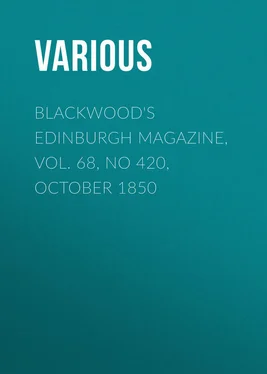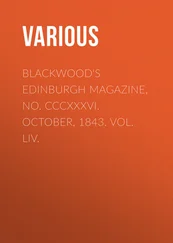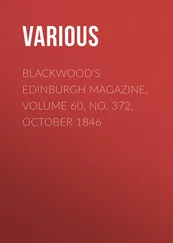Various - Blackwood's Edinburgh Magazine, Vol. 68, No 420, October 1850
Здесь есть возможность читать онлайн «Various - Blackwood's Edinburgh Magazine, Vol. 68, No 420, October 1850» — ознакомительный отрывок электронной книги совершенно бесплатно, а после прочтения отрывка купить полную версию. В некоторых случаях можно слушать аудио, скачать через торрент в формате fb2 и присутствует краткое содержание. Издательство: Иностранный паблик, Жанр: periodic, foreign_edu, Путешествия и география, на английском языке. Описание произведения, (предисловие) а так же отзывы посетителей доступны на портале библиотеки ЛибКат.
- Название:Blackwood's Edinburgh Magazine, Vol. 68, No 420, October 1850
- Автор:
- Издательство:Иностранный паблик
- Жанр:
- Год:неизвестен
- ISBN:нет данных
- Рейтинг книги:4 / 5. Голосов: 1
-
Избранное:Добавить в избранное
- Отзывы:
-
Ваша оценка:
- 80
- 1
- 2
- 3
- 4
- 5
Blackwood's Edinburgh Magazine, Vol. 68, No 420, October 1850: краткое содержание, описание и аннотация
Предлагаем к чтению аннотацию, описание, краткое содержание или предисловие (зависит от того, что написал сам автор книги «Blackwood's Edinburgh Magazine, Vol. 68, No 420, October 1850»). Если вы не нашли необходимую информацию о книге — напишите в комментариях, мы постараемся отыскать её.
Blackwood's Edinburgh Magazine, Vol. 68, No 420, October 1850 — читать онлайн ознакомительный отрывок
Ниже представлен текст книги, разбитый по страницам. Система сохранения места последней прочитанной страницы, позволяет с удобством читать онлайн бесплатно книгу «Blackwood's Edinburgh Magazine, Vol. 68, No 420, October 1850», без необходимости каждый раз заново искать на чём Вы остановились. Поставьте закладку, и сможете в любой момент перейти на страницу, на которой закончили чтение.
Интервал:
Закладка:
Then came the usual contests, from time to time, as to acts and declarations of third parties, which were offered as evidence against the prisoner, though done and said in his absence, and before and after the actual outbreak – viz., to what extent he had rendered himself liable for the consequences of such acts and declarations, by embarking in a common enterprise, having a common intent with these third parties. The result of such contests was practically this, – The court acted on the rule of law, as rule established, that, in treason and conspiracy, the Crown may prove either the conspiracy, which renders admissible as evidence the acts and declarations of the co-conspirators; or the acts and declarations of the different persons, and so prove the conspiracy. A witness, for instance, said that he was at a party at a Chartists' lodge on the 2d November, when a man named Reed gave them directions to go to Newport on the following night, and explained for what purpose they were to go: but the witness did not see Frost till two days afterwards , when on his march to Newport. The Lord Chief-Justice overruled the objections of Sir F. Pollock and Mr Kelly, and received the evidence which they had attempted to exclude.
A great mass of proof was given during the trial, establishing most satisfactorily the acts and doings of Frost, throughout the progress of the conspiracy, and down to the very moment of the actual attack on the inn, and the Queen's troops stationed in it – a mass of proof on which the attempt to make an impression seemed absurd. There was only one faint ray of hope for the prisoner's counsel, throughout the palpable obscure – that they might be able to escape from the generality and publicity of object attributed to the prisoner, by persuading the jury that the object was a private, temporary, and specific one – viz., to effect the release of one Vincent, a Chartist, then in confinement at Monmouth! To pave the way for this hopeful line of defence, first, an artful turn was sought, in cross-examination, to be given to one of the early witnesses. He swore that he had heard one of those who attacked the inn, exclaim at the time, presenting his gun at one of the special constables at the door, "Surrender yourselves our prisoners;" to which the gallant answer was, "No, never!" On this Mr Kelly very warily cross-examined the witness, with a view of showing that, in the confusion, he could not hear very distinctly, so as to report distinctly, as to precise expressions; that the mob intended merely to rescue Vincent; and that the expressions used must have been, not "Surrender yourselves our prisoners," but "Surrender up our prisoners!" or simply, "Surrender our prisoners," – thus rejecting, from the witness's answer, the single significant word "yourselves." The attempt, however, was wholly ineffectual; but out of two other witnesses were extorted on cross-examination, the following (so to speak) crumbs of comfort: from one – "I have heard Vincent's name mentioned many times; I have heard Williams (one of the leaders of the three bands forming the ten thousand) say that Vincent was a prisoner at Monmouth: the people there liked him very much; the people knew he was in jail. I have heard them speak about him." Another witness said, – "I knew of Vincent's being sent to prison: I believe the Chartists took a great interest in his fate: I do recollect something of dissatisfaction about Vincent's treatment, and about a petition to be drawn up: I recollect people's minds being dissatisfied about it." Another witness, however, said "that at midnight on the Sunday, (the 3d November,) Williams came to his house with a number of armed men: " the witness inquired, "Where are you going?" – "Why do you ask?" said Williams. "Because," answered the witness, "some of the men who were with me have told me, this morning, that they were going to Monmouth, to draw Vincent out of prison." – " No ," replied Williams, " we do not attempt it : we are going to give a turn as far as Newport."
The Attorney-General closed his case with the arrest of Frost, heavily armed, and in concealment, on the evening of the day on which he had attacked the inn with his five thousand men; and thus stood the matter, when, after a considerable interval for repose and reflection, courteously conceded by the Lord Chief-Justice, at the implied request of Sir Frederick Pollock, that most able and upright advocate rose to address the jury for the defence. Judging from the specimens afforded us by Mr Townsend, Sir Frederick Pollock's address appears to have been pervaded by a strain of dignified and earnest eloquence, and also characterised by a candour in dealing with facts which was in the highest degree honourable to him, and also equally advantageous to the prisoner, on whose behalf such conduct was calculated to conciliate both the judges and the jury. His line of defence was, that, admitting enormous indiscretion on the part of Frost in assembling so vast a body of men, and marching and appearing with them as he did at Newport, there was no satisfactory evidence of his having done so with a treasonable purpose. He had been guilty of a heinous misdemeanour; but the treasonable declarations and exclamations put into his and their mouths, in order to give the affair a treasonable complexion, had been either misunderstood or perverted by the witnesses. The sole object of Frost and his friends was the release of Vincent; that they had never dreamed of taking , or attacking the town of Newport – least of all, as an act of general rebellion; that all they had meant was to take a "turn" as far as Newport, to get Vincent out of prison; and that "that was the true character of the whole proceedings;" that Frost did not know that the military were in the inn; and that, the instant they had become visible, and had fired, the crowd succumbed, threw down their arms, and ran away — i. e. they did this "the very moment there was any prospect of what they were doing being construed into treason." That Frost could not have contemplated treason, and throwing the whole country into confusion, would be evidenced by proof, and his having made provision for the payment of a bill of exchange, and actually paying it on the very Monday on which the outbreak occurred. Sir Frederick Pollock properly insisted on the burthen of proving treason lying on the Crown, and not of disproof on the prisoner. Then were called one or two witnesses, with a view to showing expressions of the crowd that they had come to Newport in quest of their prisoners who were there; but the evidence proved ridiculously insufficient and contradictory. Then was read, with the Attorney-General's consent, a letter of Frost's in the previous September, to one of the visiting magistrates of the gaol of Monmouth, requesting some relaxation of the prison discipline to which Vincent and other prisoners were subject; and it appeared, also, that a similar application had been made to the Lord-Lieutenant of the county. Then was proved Frost's having taken up his acceptance on the 4th November; and his character for humanity as specially instanced in his having protected Lord Granville Somerset from personal violence, during the Reform riots of 1832. Finally was called a witness, with the view of negativing the design imputed to Frost of preventing the Welsh mail from going to Birmingham, by showing the absurdity of that course, since a new and different mail started from Bristol to Birmingham, and not the same coach which had come from Newport. But to this witness were put the following significant, and probably unsuspected, questions: —
" Attorney-General. – You took an interest, I suppose, in Vincent? — A. I did so.
" Attorney-General. – You had not been told that there was to be any meeting for Vincent on the 4th of November, had you? — A. No.
Читать дальшеИнтервал:
Закладка:
Похожие книги на «Blackwood's Edinburgh Magazine, Vol. 68, No 420, October 1850»
Представляем Вашему вниманию похожие книги на «Blackwood's Edinburgh Magazine, Vol. 68, No 420, October 1850» списком для выбора. Мы отобрали схожую по названию и смыслу литературу в надежде предоставить читателям больше вариантов отыскать новые, интересные, ещё непрочитанные произведения.
Обсуждение, отзывы о книге «Blackwood's Edinburgh Magazine, Vol. 68, No 420, October 1850» и просто собственные мнения читателей. Оставьте ваши комментарии, напишите, что Вы думаете о произведении, его смысле или главных героях. Укажите что конкретно понравилось, а что нет, и почему Вы так считаете.












